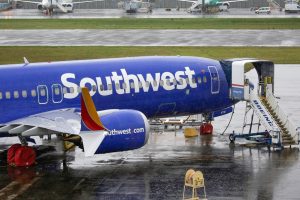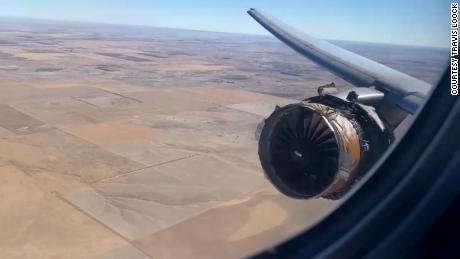Boeing's 737 Max returns to commercial service

New York (CNN Business)Two years after a 737 Max system failure led to fatal crashes, airlines are rapidly bringing the Boeing jet back into service.
On Thursday, Southwest Airlines (LUV), which owns more of the jets than any other carrier, will become the 15th airline to fly the plane since the grounding was lifted in November.
All 737 Max planes were grounded world-wide in March of 2019 after the crash of Ethiopian Airlines Flight 302 — the second fatal crash in five months involving the jet. The two crashes killed everyone on board, a total of 346 people.
Boeing insists that 20 months of investigation, improvements and review by the Federal Aviation Administration has made the plane as safe or safer than any other. But critics — including family members of those killed — disagree.
There have so far been more than 9,000 passenger flights aboard the aircraft since the grounding was lifted, according to Boeing (BA). Brazilian carrier GOL and American Airlines (AAL) became the first carriers to fly passengers on a 737 Max in December. American has used the plane on more than 400 flights, more than any other airline, according to Cirium, which tracks passenger jet usage.
“Bookings on the Max are comparable to other aircraft, and we aren’t seeing data to suggest customers don’t want to fly the aircraft,” said a spokesman for American.
United (UAL) recently placed an order for 25 additional Max jets, and sped up its delivery schedule on prior orders. Alaska Air (ALK) recently took deliveries of its first Max jets.
Despite the move to add more new aircraft into service, there are still 1,658 earlier versions of the 737 jet parked worldwide due to lack of demand for air travel, according to Cirium. That’s nearly a quarter of the global fleet of those planes sitting unused. The return of the 737 Max will mean that more older planes will remain idle as airlines increase their use of the newer models instead.
“The Max is more reliable. It has a lower fuel burn. It’s quieter. It’s less expensive to maintain, and it’s our most comfortable aircraft from a customer perspective” Michael Van de Ven, chief operating officer of Southwest, told investors in January. “And it is a key component of our future.”
Southwest said it has conducted 200 test flights with the planes since December. The airline expects to use the Max on about 44 flights per day in its first month and will serve some 15 cities including Atlanta, Baltimore/Washington, Las Vegas, Denver and Salt Lake City, as well as secondary airports in Chicago and Houston.
Safety feature malfunction
The fatal crashes in October 2018 and March 2019 were caused by a malfunction in a safety feature meant to prevent the plane from climbing too rapidly and going into a stall. False readings from sensors forced down the nose on the two doomed jets, leading to the crashes. Boeing has made changes to how those sensors operate as well as to the alerts given to pilots.
But family members of some of those killed in the crashes say airlines should not be returning the aircraft to service.
Michael Stumo, whose 24-year old daughter Samya Rose Stumo died in the Ethiopian Airlines crash, said he and other family members don’t believe the changes approved by regulators have made the plane safe.
“Before Samya died in the Max crash in Ethiopia, we thought we could just trust airlines and Boeing that their planes were safe and we could expect to arrive at our destination. Now, we know that executives make bad decisions to cut corners on safety and quality to make just a bit more profit. We don’t want to see a third crash happen,” Stumo said. “Any 737 Max planes sold by Boeing now are at steep discounts.”
Internal documents show that even some Boeing employees didn’t trust the 737 Max as it was first being certified to fly, with one Boeing employee describing it to another as a plane “designed by clowns, who in turn are supervised by monkeys.”
Boeing CEO Dave Calhoun and other Boeing executives have denied the company cut corners, but they do admit that many mistakes were made that led to the crashes.
“I didn’t see at any stage in that process…an issue of a trade of safety for something else,” Calhoun said in January 2020, just after taking over as CEO. He said the problems with the jet were due to a mistake in “judgment that everyone wishes wasn’t made.”
As for current sales of the 737 Max, Boeing does not comment on the price of its planes. But experts agree that the long grounding, combined with the weaker market caused by the pandemic, means that Boeing is likely offering deep discounts on the sales it is making now.
Deliveries resume
Boeing has sold 121 of the Max jets since November. In addition to the 25 sold to United last month, 75 went to Irish discount carrier Ryanair. Boeing also sold an additional 14 Max jets in February and seven in December to unidentified buyers. Even so, those sales represent a fraction of the nearly 800 737 Max orders that were canceled since the grounding was imposed.
Boeing also booked 43 orders for other commercial jets in February, bringing total orders for the month to 82 and marking the first time since 2019 that new orders outpaced canceled ones. There were 51 canceled orders in February, 32 of them for the 737 Max.
Boeing has now delivered a total of 87 new Max jets in the three months since the grounding was lifted. That’s nearly as many planes as Boeing delivered in the nine months starting in March 2020 when the pandemic sparked a plunge in air travel.
Boeing had continued to build the jets during the grounding, but had been unable to deliver them.
The deliveries are important because Boeing receives most of its revenue at the time of delivery. A plunge in deliveries in 2020 -— to 157 commercial jets from 380 the year before— caused the worst revenue loss in Boeing’s history as well as massive job cuts at the company.
The biggest challenge still facing the Max is its lack of approval to fly in China. Nearly 20% of the 435 Max jets delivered worldwide since its debut have gone to Chinese airlines or leasing companies, but none have been allowed to fly in Chinese air space since the March 2019 grounding. To date, 160 of 195 global aviation regulators have cleared the plane to resume carrying passengers.
Source: Read Full Article

